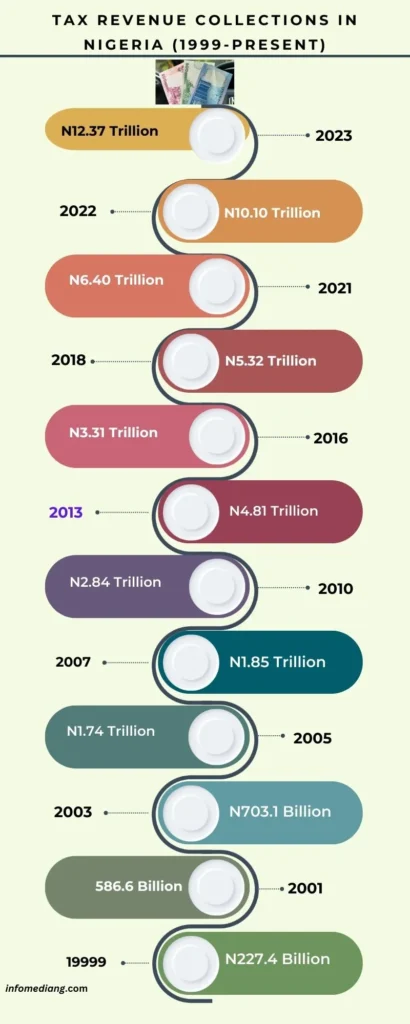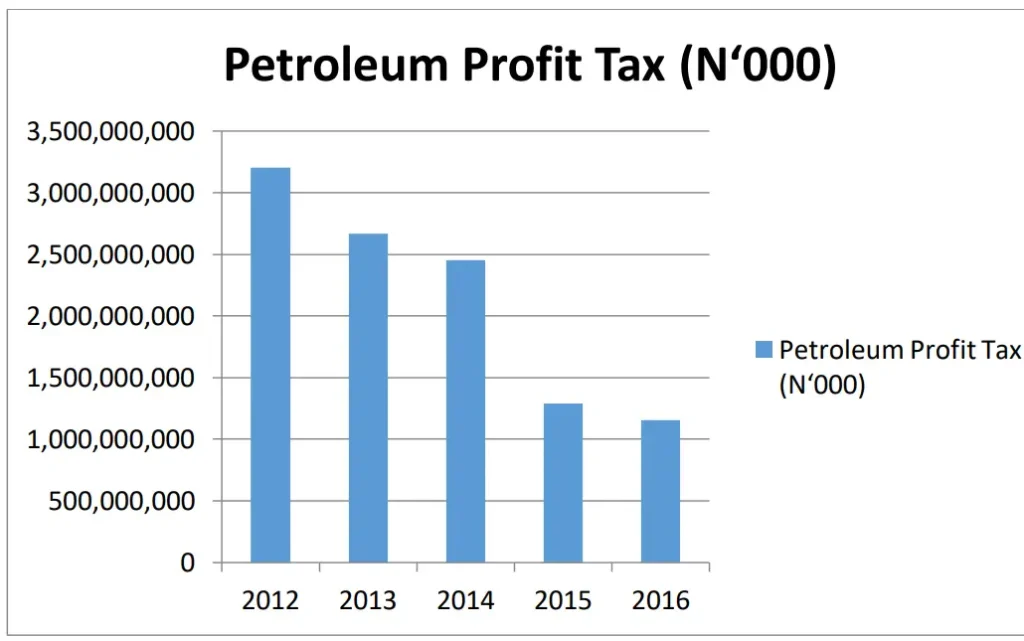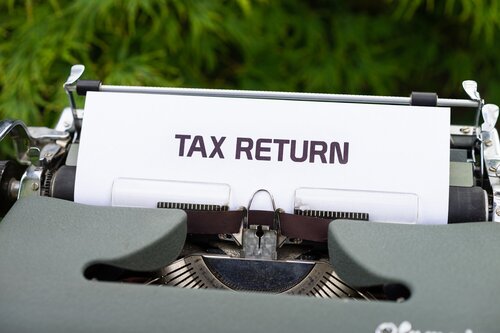The Federal Inland Revenue Service (FIRS) collected at least N89.077 Trillion in 25 years, increasing its tax revenue by 1,936.48% between 1999 to 2023, Tax Revenue Statistics on the agency’s site reveals.
FIRS is an agency of the Federal Ministry of Finance in Nigeria with the core functions of assessing, collecting, remitting, and accounting for the federation taxes.
It also collects Petroleum Profit Tax (PPT) on behalf of the government which is remitted to the government account.
Report of Tax Revenue Collected By FIRS in 25 Years

Despite the issues of tax avoidance and evasion in Nigeria, the tax collection agency has shown it can collect tax on behalf of the government.
For instance, it collected N227.4 Billion in 1999 and by 2000, it rose to N455.3 Billion, increasing its tax collection by approximately 21.98 percent.
For the first time since Nigeria returned to democratic rule (1999). The agency crossed a trillion mark during the tenure of Mrs Ifueko Omoigui-Okauru as the Chairman of the agency (2004-2012).
It reported N1.194 Trillion in revenue collection in 2004, increasing revenue collection by 69.76% in 2004 as against N703.1 Billion it achieved in the previous year (2003).
Here is the timeline of revenue collections by FIRS from 1999 to 2023:
- 1999: N227.4 Billion
- 2000: N455.3 Billion
- 2001: 586.6 Billion
- 2002: N433.9 Billion
- 2003: N703.1 Billion
- 2004: N1.194 Trillion
- 2005: N1.74 Trillion
- 2006: N1.87 Trillion
- 2007: N1.85 Trillion
- 2008: N2.97 Trillion
- 2009: N2.197 Trillion
- 2010: N2.84 Trillion
- 2011: N4.63 Trillion
- 2012: N5.00 Trillion
- 2013: N4.81 Trillion
- 2014: N4.71 Trillion
- 2015: N3.74 Trillion
- 2016: N3.31 Trillion
- 2017: N4.03 Trillion
- 2018: N5.32 Trillion
- 2019: N5.26 Trillion
- 2020: N4.95 Trillion
- 2021: N6.40 Trillion
- 2022: N10.10 Trillion
- 2023: N12.37 Trillion
To Increase Revenue By More Than 56% in 2024
FIRS is planning to increase its collections by 56.84% in 2024, from N12.37 Trillion (2023) to N19.4 Trillion, by relying on voluntary tax compliance and a new organizational structure.
According to its chairman, Zacch Adedeji, the new organizational structure will kick off in February 2024.
It plans to collect N9.96 trillion in tax revenue from oil and N9.45 trillion of non-oil revenue, document seen by Infomediang reveals.
“The real strategy is to drive voluntary compliance, and there will always be consequences for non-compliance, and that is where this structure is going.”
FIRS boss
The N19.4 Trillion target is achievable because Nigeria’s tax collector has a history of surpassing its target.
In the year 2000, it set N380.5 Billion, it surpassed it by collecting N455.3 Billion; N500.7 Billion in 2001, but raked in N586.6 Billion; it set N800 Billion target in 2004, but ended the year collecting N1.194.8 Trillion.
But there are exceptions: its target for 2006 was N3.054 Trillion, but ended up collecting N1.866 Trillion; N4.572 Trillion target for 2015, but reported that it collected N3.741.8 trillion.
Described as innovative by President Bola Tinubu, we expect Adedeji to bring his innovations into the tax system.
Where Does The Tax Revenues Come From?
FIRS collects the highest percentage of its revenue from Petroleum Profit Tax. For instance, it collected N3.2 trillion in 2012, N2.6 Trillion in 2013, and approximately N2.5 Trillion in 2014 from PPT.

Entities that are subjected to PPT:
- Companies engaged in petroleum exploration and production operations in Nigeria (upstream operations).
- A person resident in Nigeria employed in the management of the petroleum operations carried on by a non-resident company.
- The liquidator, receiver, or agent of liquidator or receiver of any company carrying-on petroleum operations in Nigeria.
Other sources:
Apart from Petroleum Profit Tax, other sources of tax revenues for Nigeria’s government are:
- Companies Income Tax (CIT)
- Withholding Tax on companies, residents of the Federal Capital Territory and non-resident individuals (WHT)
- Value Added Tax (VAT)
- Education Tax (ET)
- Capital Gains tax (CGT)
- Pay as you earn (PAYE)for residence of Federal Capital Territory, armed forces, police and other paramilitary organizations
Questions Nigerians Ask
Going by the number of cases of corruption among people at the helm of affairs, some of the questions millions of Nigerians ask when they hear trillions of Naira in revenue generated by the government every year include:
- Where are the monies?
- Why are we still borrowing?
How Nigeria Should Utilize Its Revenues From Taxes
Many things need the attention of the government to propel Nigeria’s economic development.
Nigeria can deploy funds from taxation to solve problems in the following areas:
Infrastructure Development
Most of the so-called federal roads are death traps or points of kidnapping for criminals because they are poor states.
The government can invest in the construction and maintenance of its roads, bridges, ports, and utilities. A well-developed infrastructure can stimulate economic activities and improve the quality of life for citizens, particularly for the use of farmers in the villages who need to move their farm produce to towns and cities.
Education
Nigeria should allocate funds to improve and expand educational facilities, provide quality education, and ensure access for all citizens, through loans and grants to students of tertiary institutions.
That’s why we commend the recent announcement by the government regarding its plans to fund the newly launched Student Loan Scheme through the Education Tax.
The FIRS boss explained in Abuja that deploying the Education Tax Fund in the scheme is one of the ways the government can be accountable to taxpayers in Nigeria. This is indeed commendable.
Investing in education contributes to a skilled and competitive workforce, fostering innovation and economic development.
Healthcare
Nigeria’s government should work closely with the Federal Ministry of Health and Social Services to increase the number of Primary Healthcare Centres across Nigeria.
This ensures that citizens have access to quality healthcare, leading to a healthier and more productive population.
Debt Reduction
The debt profile of Nigeria‘s public debt stock – which includes external and domestic debt – stood at N87.38 trillion (US$113.42 billion) in the second quarter of 2023, according to data from the National Bureau of Statistics, while the government continues to rake in trillions from tax revenue.
So, revenues from taxes can be deployed to prudently manage public finances to avoid excessive debt accumulation. Prioritize debt reduction strategies to ensure fiscal sustainability and stability.
Social Welfare Programs
Implement social welfare programs to support vulnerable populations, such as the elderly, disabled, and economically disadvantaged and support millions of unemployed Nigerian graduates.
This support can include social security, unemployment benefits, poverty alleviation initiatives, and skill training acquisition.
Technology and Innovation
Invest in research and development, technology infrastructure, and innovation to foster economic competitiveness and adaptability to changing global trends.
Our Take:
We believe that Nigeria should effectively utilize revenues from taxation to improve the living standards of its people by directing these substantial amounts towards infrastructural development. This, in turn, will have a positive impact on the lives of the population.
Tax administration should focus on wealth creation and employment, rather than merely setting targets.
The utilization of tax collections must serve to convince the populace that their contributions have a tangible effect on the economy, rather than benefiting private pockets.


